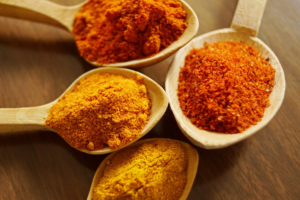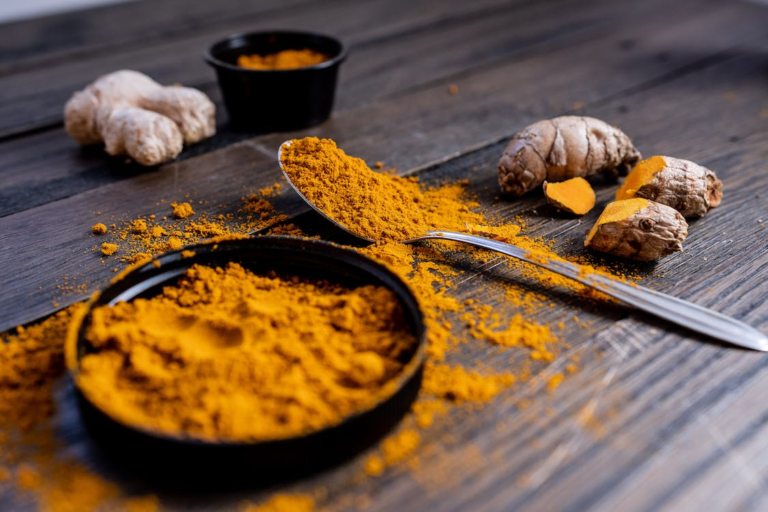The golden spice turmeric has been used medicinally since ancient times. Curcumin, a therapeutic ingredient of turmeric, is mainly responsible for its health advantages. Curcumin possesses anti-inflammatory and antioxidant properties as a result of its chemical composition.
Although modern science is only beginning to investigate turmeric’s benefits, many people think it has a number of applications for the skin and allergies as well. The complexion may appear glowing and smooth because of these qualities. Likewise, people also think that turmeric can restore your skin’s natural radiance.
Curcumin, a powerful anti-inflammatory ingredient present in turmeric, helps to control allergy symptoms and reduce inflammation. You can use turmeric to cure moderate symptoms of allergic responses, though the best course of action relies on how severe your illness is. To discover if the herb benefits your allergies, you might want to give turmeric a shot at home. We are going to explore, the effectiveness of curcumin for allergies, how it acts, and its applications in depth here.
The Healing Power of Turmeric
The curcumin in turmeric can speed up the healing of wounds by reducing oxidation and inflammation. Additionally, it lessens how quickly your body reacts to skin wounds. Your injuries will heal more rapidly as a result. There have been many studies that show that turmeric helps collagen production and skin tissue tightening.
The publication Life Sciences advises the application of curcumin as part of an optimal formulation for treating skin sores. Curcumin also speeds up the process of wound healing since it encourages the creation of the growth factors necessary for wound healing. Therefore, you should regularly take the best turmeric supplement with black pepper if you suffer from skin allergies.

The following are several ways that turmeric can help you manage your allergies. So, let’s take a look at some ways turmeric relieves allergies:
Helps in Curing Skin Problems
Turmeric’s anti-inflammatory and antioxidant properties may benefit your psoriasis by reducing flare-ups and other problems. According to the National Psoriasis Association, you can take it directly or as a supplement. The organization advises consulting a specialist about the right dosage before attempting it. If you want to lessen pimples and any resulting marks, you might want to give a turmeric facial mask a try. The anti-inflammatory properties can relax the skin and target your blackheads. Scarring is also thought to be lessened by turmeric. Your face may benefit from this mix of applications if you have skin problems.
If you want to lessen acne and scarring, you might want to give a turmeric face mask a try. The anti-inflammatory properties can relax the body and target your pores. There is also a belief that turmeric can help to reduce bruises. Your face may benefit from this mix of applications if you have skin problems. A herb called neem was combined with turmeric in an earlier trial to cure scabies. Scabies is a skin rash-producing disorder brought on by tiny parasites.
Research on turmeric’s potential to treat various skin problems is insufficient to draw firm conclusions. However, alopecia, eczema, lichen planus, as well as other skin conditions may benefit from its use. A study published in Therapeutic applications Research suggests more investigation into turmeric’s impact on various skin diseases. The study of turmeric as a skin remedy is gaining popularity.
Healthy For Asthma Patients
Turmeric can cure allergies and asthma; the polyphenolic flavonoid curcumin, a component of turmeric, can regulate your immune response and stop mast cells from releasing histamine, which causes an inflammatory reaction and itching.
Helpful in Rhinitis
There’s also a way to treat allergic rhinitis with turmeric. Curcumin can help with sneezing, runny nose, and other allergic rhinitis issues. People with persistent seasonal allergies saw curcumin improve nasal circulation in a two-month study.
Beneficial For Itching
Therapeutic curcumin is a good anti-itching treatment, according to a mouse study. It might lessen itchiness brought on by histamine release. The capsaicin receptor was inhibited by curcumin in mouse nerve cells. The blistering and unpleasant feelings are caused by TRPV1 neurons.
Turmeric can assist in keeping your skin healthy when applied topically and when consumed orally. This herb possesses antibacterial and anti-inflammatory qualities. It aids in the treatment of several skin disorders, including vitiligo, alopecia, eczema, hypersensitivity, and pimples. But for the best and most immediate results, use turmeric curcumin with Bioperine, as it gets absorbed by blood faster.
Before We Part!
There is little preliminary evidence to back the utilization of turmeric or its main ingredient, curcumin, to cure allergies, despite its possible health advantages. As a result, ground turmeric has a long history of usage in herbal remedies and is healthy to use. The topical solutions that contain turmeric often have the advantage of being suitable for both adults and children. Before consuming turmeric supplements, always consult a medical practitioner.

Odyssey has been the lead content writer and content marketer. He has vast experience in the field of writing. His SEO strategies help businesses to gain maximum traffic and success.

